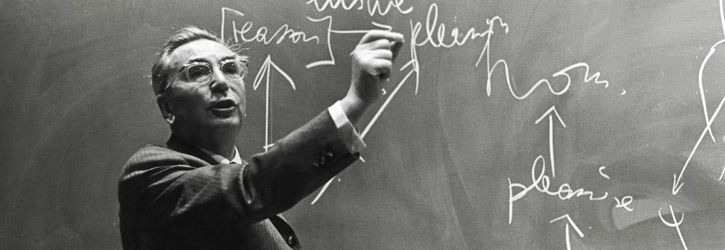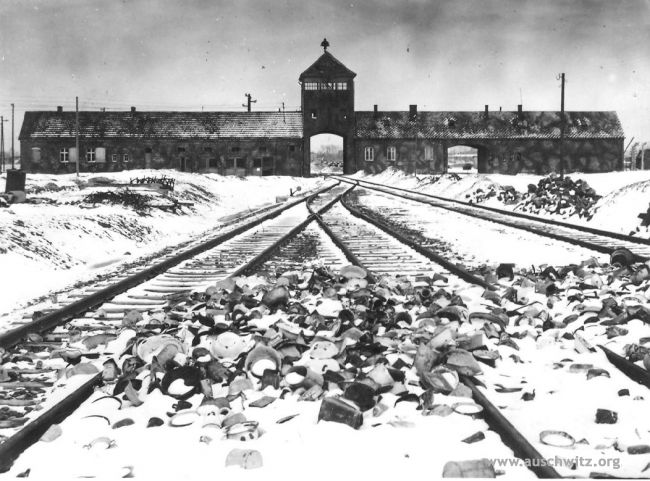
EspañolI first heard about Viktor Frankl’s Man’s Search for Meaning in early 2011, during an excellent class given at a citizen leadership course. There were only a few students in the class. The professor fired question after question at us as a way to have us reflect on what motivates man to make decisions in response to challenging circumstances. Through this exercise, and the debate that ensued, the professor explained basic ideas of ethics and human behavior.
At the end of the class, he encouraged us to investigate Frankl’s other works. He suggested we focus on Man’s Search for Meaning in order for us to understand there is a kind of freedom which cannot be stolen, even by the most ruthless tyrants – a spiritual freedom. I did not follow the professor’s suggestion immediately. It was only at the end of that year that I finally started reading the book. Ever since, I have recommended it profusely.

This book has instilled in me the notion that freedom is the ultimate achievement of man.
Viktor Frankl was an Austrian psychiatrist and Nazi extermination camp survivor. He also founded the psychological school of logotherapy, which centers on the study of human existence and the path one follows in order to determine its meaning.
Frankl divides his book into two parts. The first recounts his time spent as an Auschwitz and Dachau prisoner. The second briefly explores logotherapy.
In part one, the author presents his personal analysis of the human condition from the perspective of both the prisoner and the warden. This section of the book is divided into three separate phases of his imprisonment: first days after internment, daily routine in the camps, and life after liberation.
First Phase: The Only True Possession Is One’s Own Existence
While we were waiting for the shower, our nakedness was brought home to us: we really had nothing now except our bare bodies — even minus hair; all we possessed, literally, was our naked existence.
Frankl begins by narrating the initial days in the camp, where prisoners underwent a brutal process of psychological transformation. He also details the phenomenon of “dying” before prisoners actually lost their life; they exchanged their previous human identity for a number. They soon lost all hope for the prospect of freedom, and came to realize their only possessions were their physical body and human existence.
Second Phase: Apathy in the Face of Emotional Death
Disgust, horror, and pity are emotions that our spectator could not really feel anymore. The sufferers, the dying and the dead, became such commonplace sights to him after a few weeks of camp life, that they could not move him anymore.
In the face of such hardship, prisoners began to lose their grip on reality, and grew impervious to the evil that that surrounded them. This lack of empathy was integral part of a survival mechanism than began to develop over time — a protective shell to shield them from an existence without dignity.
The prisoners regressed to a primitive state which was reflected through dreams of a previous lifestyle. Simple things, like eating a cake, stood in direct contrast to the starvation they were currently experiencing.

Despite spending much of their time dwelling in this inner sanctum — an effort to escape the horror that surrounded them — prisoners continued to discuss the progress of the war and political situation, based on rumors that trickled into the camp. Many shared strong religious convictions, and services were held in their barracks.
The intensifying effects of living deep within oneself allowed them to develop an appreciation for the beauty of art and nature. Frankl recounts one instance in which he observed two prisoners admiring the reflection of the radiant sky in a puddle. One of them remarked to the other, “How beautiful the world could be!”
Third Phase: Return to Freedom
We found the prairies covered in flowers. We gazed at them and we realized they were there, but the did not wake any feelings in us.
Surprisingly, prisoners who regained their freedom did not react with euphoria. They repeated to each other, “We are free! We are free!” However, these words did not seem to hold any meaning. The body became accustomed to freedom, but the mind did not. They experienced an insatiable desire to discuss what happened, and many of them wanted to become oppressors themselves.
Survivors thought there was no freedom or happiness that could replace their past suffering. It also became very difficult to cope with the disappearance of people and things from their past lives. For many, the greatest challenge of all was overcoming the disillusion of their newfound freedom.
Spiritual Freedom
We who lived in concentration camps can remember the men who walked through the huts comforting others, giving away their last piece of bread. They may have been few in number, but they offer sufficient proof that everything can be taken from a man but one thing: the last of human freedoms — to chose one’s attitude in any given set of circumstances, to choose one’s own way.
With this book, and the subsequent development of logotherapy, Frankl teaches us that freedom can be found even in the worst circumstances; that suffering can give meaning to existence; and that there can be much more to imprisonment than being in shackles.
However, the journey towards the development of this mindset is an arduous one. It requires confrontation with one’s self. This is not an easy battle, and it will be fought more than once. Spiritual freedom must be won every day.
I do not like self-help books, and to portray Man’s Search for Meaning in that light is not my intent. It is a book, however, that allows existential frustration to be viewed from a different perspective.
Frankl’s book is not an easy read. Throughout the heartbreaking scenes, we are left to wonder how man can endure such extreme hardships. Frankl shows us how, in the midst of such evil and pain, the victims of these atrocities could still appreciate the beauty of a sunset, discuss the meaning of existence, develop their faith, and maintain a sense of humor.
If so many of them found meaning in their sorrow, why can’t we — who have never walked those dark paths — try to find the meaning in our existence?
 Versión Español
Versión Español












